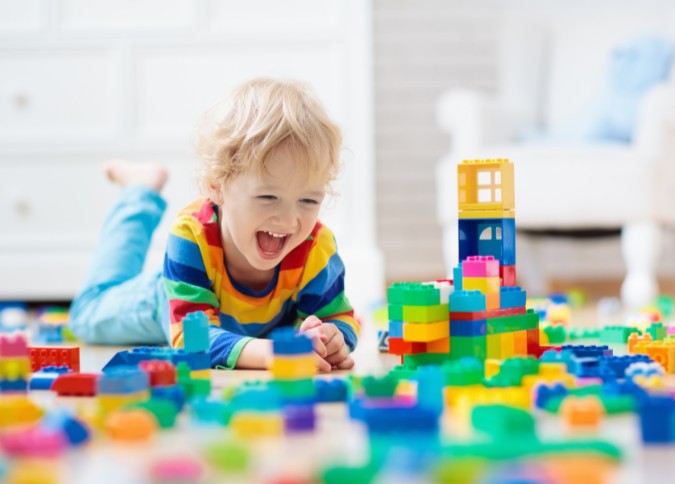 Parenting children often means numerous hours sitting on the floor being asked to do the same thing over and over. Play, for some parents, can be uninteresting and exhausting. Does that make you a bad parent? No. That makes you human.
Parenting children often means numerous hours sitting on the floor being asked to do the same thing over and over. Play, for some parents, can be uninteresting and exhausting. Does that make you a bad parent? No. That makes you human.
However, for children, play is their world. It’s how they express themselves, build relationships, and learn about their environment.
Play is a crucial piece to child development. As a parent, your role is to not only take time to connect with your child through play, but also, allow the space and opportunity for your child to play.
So, why should you, as a parent, encourage play in a child?
1. Play is the language of your child
Think about a time when you were new to a job. You might have spent a considerable amount of time in the early days getting to know your co-workers. This could have been done over mid-morning coffee breaks, lunch outings, or even happy hour gatherings – where you might have talked about what your co-workers enjoy doing beyond work.
How does that personal connection with children? Enter play. When you sit on the floor and play with your child, you are able to gain insights to what your child is thinking or feeling. Play allows your child to communicate with you. And, as a result, you begin to understand what your child’s interests are as you notice what types of toys they gravitate towards and what type of play they engage in.
2. Play allows for recharge and relaxation in children
After a long day, how do you relax and recharge? Adults often focus on healthy coping skills to handle the nuances of the day-to-day. The same need is for children as well. When children have a difficult day, they often wish to just spend time with their parents doing something they enjoy.
Play is one of the best ways to help a child recharge and relax after challenging days or situations. When a parent is able to offer their child undivided attention in play, it allows a child the opportunity to practice healthy play skills to assist with emotional regulation. It allows the child to process their difficulties and reset their mind in order to tackle the next day.
3. Play promotes creativity, exploration, and imagination
Adults often use various tools to spark creativity or imagination for their next big project at work or at home. It is not unheard of for an adult to scroll endlessly on Pinterest or Google in order to spark their imagination.

What does this same spark look like in children? Play. There are incredible benefits in allowing a child to lead play. It encourages children to build creativity, exploration, and imagination. In play, a child can create a world with endless possibilities. It can help a child expand their thinking on how to bring something into life from their imagination. Play is incredibly beneficial to helping children grow and explore their world.
4. Play encourages problem solving and resolution-oriented thinking
When adults are stuck on a problem, they may take time away from the problem or continue to try different solutions to find an eventual answer. For children, play allows a child’s brain to work and re-work different problem sets using multiple trial-and-error approaches. It encourages a child to develop and implement problem-solving skills to achieve their desired outcome. These skills are necessary for a person to be successful in life; and play provides the necessary foundation for a child to develop and learn those skills.
So, how does play fit with therapy?
 Therapists who work with children recognize the need for children to play. Play therapy is deeply restorative for children by allowing them to work through difficult feelings and experiences through play.
Therapists who work with children recognize the need for children to play. Play therapy is deeply restorative for children by allowing them to work through difficult feelings and experiences through play.
Our trained therapists can assist children in developing skills to regulate emotions, build confidence, and tackle everyday issues – all using the power of play.
If you have a child you think may benefit from play therapy, please reach out to us. We’ll connect you with a counselor best suited for your little one.
Written by Jennifer Munroe, LPC, NCC
